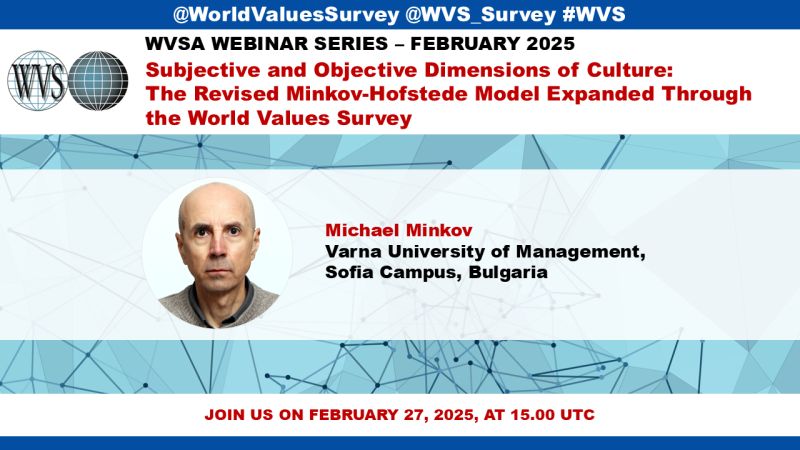

World Values Survey Webinar: Subjective and Objective Dimensions of Culture: The Revised Minkov-Hofstede Model Expanded Through the World Values Survey
Thu, 27 Feb 2025 - Thu, 27 Feb 2025
Online
Organized by: World Values Survey
In this monthly session, we invite scholars from various disciplines who utilize the WVS survey data (solely or in combination with other datasets) to share their new findings and insights. The webinars will cover a broad scope of topic measured through the time-series WVS surveys, including both substantive issues and methodological aspects.
Herewith, we are delighted to invite you to our first webinar in the series. In this webinar, our invited speaker Michael Minkov (Varna University of Management, Bulgaria) examines how cultural dimensions can be reduced to two fundamental factors—individualism-collectivism and flexibility-monumentalism—which not only align with previous cultural models but also predict key societal indicators across countries, demonstrating their broad applicability and objectivity. The webinar will take place on 27 February 2025 at 15:00 UTC.
REGISTER NOW
In a series of papers, Michael Minkov and associates showed that Hofstede's classic model of culture should be reduced to just two dimensions: individualism-collectivism (IDV-COLL) and long-term orientation, renamed “flexibility-monumentalism” (FLX-MON), resulting in a cultural map of the world that is a rotated and flipped variant of the Inglehart-Welzel map. Recent studies showed that: (1) all valid and reproducible dimensions of culture, from all models, are essentially variants of IDV-COLL and FLX-MON, (2) the revised Minkov-Hofstede 2D model has a close analogue in dimensions of behaviors measured across the world's countries, (3) the same model emerges across the 50 US states, (4) the Minkov-Hofstede model is aligned approximately with the Earth's geographic axes, which gives it an element of objectivity, (5) an analysis of all recurrent culture-related items in the World Values Survey (WVS) yields a similar 2D model. In view of (5), the original Minkov-Hofstede scores for 55 countries were expanded with WVS scores for another 47 countries. Those IDV-COLL and FLX-MON 102-country scores are predictors of 20 important extraneous variables, such as transparency-corruption, political and economic freedom, competitiveness, innovation output, ICT adoption, fatalities in transport and industry, gender equality, economic equality, educational achievement, working hours, violent crime, family structure, etc. These national indicators yield two principal components that are strongly associated with IDV-COLL and FLX-MON. This makes the revised Minkov-Hofstede 2D model, expanded through the WVS, an especially useful tool for explaining a great number of objective global societal differences, as they are also reducible to a similar 2D model [read full paper text]
Michael Minkov, is professor of Cross-Cultural Awareness at Varna University of Management (VUM), Sofia campus, Bulgaria. He holds a PhD in Social Anthropology from the University of Sofia (Kliment Ohridski) and an MA degree in linguistics, also from that university. Michael Minkov's main research interests and main publications are in the field of national cultures and societal differences. He was a close academic associate of Geert Hofstede and has published articles that expand, update, and completely revise Hofstede's model of national culture.











